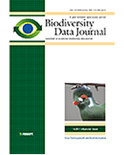
Biodiversity Data Journal
metrics 2024
Connecting data and conservation for a healthier ecosystem.
Introduction
Biodiversity Data Journal, published by PENSOFT PUBLISHERS, is a leading open-access platform that has been facilitating the dissemination of scientific knowledge since its inception in 2013. With a focus on enriching the fields of Agricultural and Biological Sciences, Animal Science and Zoology, Ecology, and Plant Science, this journal plays a pivotal role in promoting research outputs related to biodiversity, encompassing ecological data, species inventories, and conservation strategies. It has achieved commendable rankings in various categories, notably securing a Q2 rating in several key areas, indicating its growing influence within the academic community. The journal’s contribution to advancing the understanding of biodiversity is further enhanced by its commitment to open access, ensuring that vital research findings are widely accessible to researchers, professionals, and students worldwide. By publishing comprehensive datasets and innovative research, the Biodiversity Data Journal remains an essential resource for those looking to stay at the forefront of biodiversity science and environmental stewardship.
Metrics 2024
 0.37
0.37 1.00
1.00 1.10
1.10 32
32Metrics History
Rank 2024
Scopus
IF (Web Of Science)
JCI (Web Of Science)
Quartile History
Similar Journals

Vertebrate Zoology
Championing Open Access in Zoological StudiesVertebrate Zoology is a prestigious open-access journal published by the Staatliches Museum Tierkunde Dresden in Germany, focusing on the intricate and diverse field of animal biology. With an ISSN of 1864-5755, the journal has established itself as a vital resource for researchers, professionals, and students in the realms of Animal Science and Ecology, Evolution, Behavior, and Systematics. Since transitioning to open access in 2021, it has expanded accessibility and global dissemination of research findings, showcasing significant studies that contribute to our understanding of vertebrate fauna. The journal's impressive Q1 quartile rankings in both Animal Science and Zoology, as well as Ecology and Evolution, underscore its influence within the academic community—ranking #95 and #220 in their respective categories according to Scopus. Spanning from 2011 to 2024, Vertebrate Zoology aims to provide a comprehensive platform for innovative research, fostering collaboration and advancing knowledge across the biological sciences.

RAFFLES BULLETIN OF ZOOLOGY
Connecting Insights in Zoology and ConservationRaffles Bulletin of Zoology, published by the National University of Singapore's Lee Kong Chian Natural History Museum, serves as a prestigious platform for the dissemination of cutting-edge research in Animal Science and Zoology, as well as Ecology, Evolution, Behavior and Systematics. With a current impact factor reflective of its Q2 category in both fields, this journal not only enhances its visibility in the academic community but also provides valuable insights into the complexities of biodiversity and conservation efforts. Covering a wide array of topics, Raffles Bulletin facilitates interdisciplinary collaboration and serves as an essential resource for researchers, professionals, and students alike. It is indexed in Scopus, ranking #233 out of 490 in Animal Science and Zoology and #406 out of 721 in Ecology, ensuring that the research published contributes significantly to the global discourse on wildlife and ecosystem management. Since its inception in 1996, this journal has bridged gaps in knowledge and continues to foster a deeper understanding of the living world.

Remote Sensing in Ecology and Conservation
Advancing ecological insights through cutting-edge technology.Remote Sensing in Ecology and Conservation is a pioneering journal published by WILEY that has been a beacon of open-access research since 2015. With an E-ISSN of 2056-3485, this journal stands at the forefront of the intersection between ecological research and technological innovation. It is recognized for its significant impact, boasting Q1 rankings across several prestigious categories in 2023, including Computers in Earth Sciences and Ecology, emphasizing its commitment to high-quality, influential scholarship. The journal provides a platform for researchers and practitioners to share their findings in remote sensing applications that advance ecological conservation efforts. Encompassing a broad scope that includes studies on landscape changes, biodiversity assessments, and environmental monitoring, it serves as an essential resource for education and practice in the field. With impressive ranks in Scopus, including a remarkable 6th place in Earth and Planetary Sciences, it continues to shape the dialogue in ecology and conservation. As an open-access journal, it champions the dissemination of knowledge, making critical research accessible to a global audience, thereby fostering innovation and collaboration in the pursuit of sustainable environmental practices.
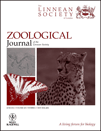
ZOOLOGICAL JOURNAL OF THE LINNEAN SOCIETY
Connecting past discoveries with future innovations in ecology.Zoological Journal of the Linnean Society, published by Oxford University Press, stands as a prestigious vessel for scholarly discourse in the fields of Animal Science and Ecology. With an ISSN of 0024-4082 and E-ISSN 1096-3642, this journal has an illustrious history dating back to its inception in 1866, and has consistently contributed groundbreaking research that shapes our understanding of zoology and evolutionary biology. Operating out of the United Kingdom, the journal boasts an impressive Q1 ranking in both Animal Science and Zoology and Ecology, Evolution, Behavior and Systematics, positioning it among the top tier of its category. With a significant presence in the academic landscape, the journal ranks 24th among 490 in Animal Science and 97th among 721 in Ecology, reflecting its impact and relevance in the field. Although it is not an open access journal, the wealth of knowledge it offers is invaluable for researchers, professionals, and students alike, aiding in the advancement of zoological sciences.

REVUE SUISSE DE ZOOLOGIE
Connecting Ecology, Evolution, and BehaviorThe REVUE SUISSE DE ZOOLOGIE, published by the esteemed MUSEUM HISTOIRE NATURELLE, is a premier journal dedicated to advancing the field of zoology and its related disciplines. Established in 1964, this Swiss journal has consistently provided a platform for high-quality research in the areas of ecology, evolution, behavior, and systematics, currently holding a commendable Q3 ranking in these categories for 2023. With a rich publication history spanning from 1964 to 1979 and then from 1994 to the present, it serves not only as a significant repository of knowledge but also as a crucial resource for researchers, professionals, and students alike. While the journal is not open access, it remains a vital tool for those wishing to stay at the forefront of zoological research and innovation. Its commitment to disseminating groundbreaking studies makes it an indispensable asset for academic institutions and researchers globally, ensuring that pivotal findings in zoology continue to gain visibility and impact.
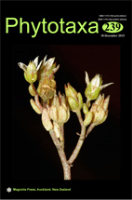
Phytotaxa, published by MAGNOLIA PRESS, is an esteemed journal in the fields of Plant Science and Ecology, Evolution, Behavior and Systematics. Established to cater to the growing need for high-quality research dissemination in botany, this journal presents the latest findings in plant taxonomy, systematics, and biodiversity. With its H-Index reflecting significant academic influence, and recognized as Q2 in Plant Science and Q3 in Ecology by Scopus, it stands as a reputable source for scholars and practitioners alike. The journal operates without open access restrictions, allowing for a wider reach to its audience. Positioned in New Zealand, Phytotaxa has been pivotal since its inception, contributing to the global understanding of plant diversity and ecology from 2010 to 2024. Its rigorous peer-review process ensures the high quality of published articles, making it an essential resource for researchers, professionals, and students dedicated to advancing the field of botany.

Bulletin de la Societe Linneenne de Lyon
Building Bridges in the Academic CommunityBulletin de la Societe Linneenne de Lyon is a distinguished journal in the field of natural sciences, published by Société Linneenne de Lyon, a renowned institution in the heart of France. This journal, bearing the ISSN 2554-5280, serves as a crucial platform for the dissemination of high-quality research articles, reviews, and discussions that focus on the diversity of life and its conservation, reflecting the foundational principles established by Carl Linnaeus. Although it operates under a traditional access model, the bulletin significantly contributes to the advancement of botany, zoology, and ecology by providing a forum for original research that often garners attention from scholars and practitioners alike. With a commitment to fostering collaboration and dialogue among researchers, this journal is positioned as a vital resource for anyone dedicated to understanding the complexities of biological sciences and systems. The impact of its publications is amplified by its ties to a prominent academic community, making it an essential read for professionals, researchers, and students eager to stay informed on the latest developments in their fields.
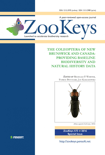
ZooKeys
Connecting Scholars to the Pulse of Zoological Research.ZooKeys, published by Pensoft Publishers, is a premier open access journal dedicated to all aspects of zoology and related biological disciplines. Since its inception in 2008, ZooKeys has emerged as a leading platform in the field, consistently showcasing groundbreaking research that spans diverse areas including animal science, ecology, and paleontology. With an impressive impact factor and categorized in the Q1 quartile for several categories such as Agricultural and Biological Sciences and Insect Science, the journal is recognized for its scholarly contributions, attracting researchers and professionals globally. Located in Sofia, Bulgaria, ZooKeys not only enhances the visibility of its publications through rigorous peer review but also ensures accessibility to vital findings, furthering academic discourse. As the journal continues to converge research efforts through 2024 and beyond, it remains an invaluable resource for students and academics aiming to stay at the forefront of zoological and ecological innovation.
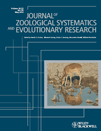
JOURNAL OF ZOOLOGICAL SYSTEMATICS AND EVOLUTIONARY RESEARCH
Illuminating the Pathways of Animal EvolutionThe Journal of Zoological Systematics and Evolutionary Research, published by Wiley-Hindawi, stands as a premier academic journal since its establishment, showcasing cutting-edge research in the fields of Animal Science, Zoology, and Ecology. With an impressive track record spanning from 1963 to the present, this journal has earned a Q1 classification in both Animal Science and Ecology, as well as recognized rankings in Genetics and Molecular Biology. Its impact is highlighted by its Scopus ranks, placing it in the top percentile for relevant categories, underscoring its vital role in advancing knowledge and understanding within these disciplines. Researchers, professionals, and students will find a wealth of high-quality, peer-reviewed articles that contribute to the evolutionary understanding of biodiversity and systematics. Though not an Open Access journal, it remains accessible to a wide audience committed to exploring the intricacies of zoology and evolutionary biology.

BIOTA NEOTROPICA
Fostering Collaboration in Ecology and EvolutionBIOTA NEOTROPICA is a prominent open access journal dedicated to advancing knowledge in the interdisciplinary field of ecology, evolution, behavior, and systematics. Published by REVISTA BIOTA NEOTROPICA since 2001, this Brazilian journal aims to provide a platform for high-quality research that fosters a deeper understanding of Neotropical biodiversity and its conservation. With an ISSN of 1676-0603 and an E-ISSN of 1676-0611, the journal has established its reputation within academic circles, ranking in the Q3 quartile for Ecology and achieving a respectable percentile of 57 in Scopus’s metrics. Operating from its headquarters in Campinas, SP, Brazil, BIOTA NEOTROPICA not only focuses on research dissemination but also encourages collaboration and exchange of ideas among scientists, students, and professionals in the field. The journal is particularly valuable for those looking to contribute to the understanding of ecological systems and promotes accessibility with its open access model.